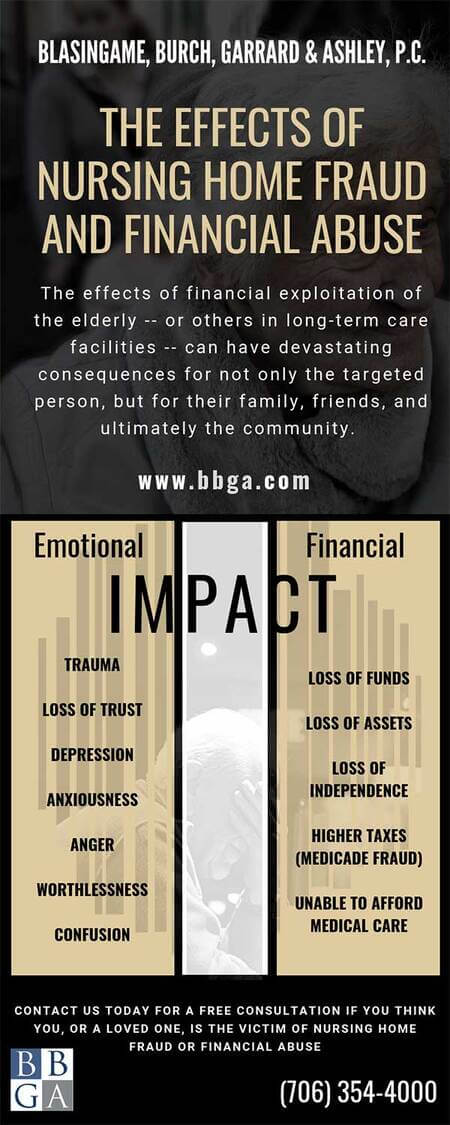 Nursing homes and other long-term care facilities can be a target for health care fraud and financial abuse. Unfortunately, because sick or elderly residents are often more vulnerable, corrupt staff and administrators take advantage of them.
Nursing homes and other long-term care facilities can be a target for health care fraud and financial abuse. Unfortunately, because sick or elderly residents are often more vulnerable, corrupt staff and administrators take advantage of them.
Elder financial abuse is when caretakers or nursing home administrators misappropriate a resident’s financial resources or use finances to control them.
There are multiple types of nursing home fraud, but the most common type involves Medicare or Medicaid fraud, which for example is when a long-term care facility bills residents for items that are covered by Medicaid and Medicare.
Types of Nursing Home Fraud
- Billing
- Billing for goods or services not rendered
- Double billing
- Charging more than a service or good is worth
- Phantom billing (Billing for a patient who doesn’t exist)
- Billing for a more expensive procedure than was performed (upcoding)
- Medicare or Medicaid Kickbacks (accepting payments, products, or services with intentions of soliciting Medicare or Medicaid business)
- Patient recruiting or enrollment fraud
- Billing Managed Care Plans for unnecessary services
- Identity theft
- Predatory lending (pressuring elderly patients into taking out inappropriate loans)
- Gaining Power of Attorney status with the intent of stealing funds
- Stealing cash or ATM cards
- Gaining access to bank accounts to withdraw funds
- Threatening residents verbally or physically in an attempt to gain access to money or other resources
- Refusing to treat a resident with necessary medical services in order to abuse the funds
- Tricking residents into signing documents with the intention of gaining access to their assets
- Financial scams
Have You Been a Victim of Nursing Home Fraud?
BBGA provides free consultations. Our team is ready to go to work for you today.
Medicaid and Medicare Fraud in Georgia Nursing Homes
Healthcare fraud can end up costing taxpayers billions of dollars and putting beneficiaries’ health at risk. There are many ways organizations or caregivers engage in Medicaid and Medicare fraud in Georgia including:
- False claims to receive payment
- Solicitation to get referrals or reimbursements
- Billing Medicare even if the patient doesn’t show
- Billing for products or services not provided
- Falsifying records
Committing Medicare or Medicaid fraud is illegal and punishable by law. Our experienced trial attorneys have recovered millions for people just like you, who are victims of fraud or abuse at the hands of their caregivers. We understand the big picture and will work with you one-on-one to get to the bottom of the issue and hold the correct people responsible. Contact us today at (706) 354-4000. There is no charge for a consultation.
Medicare Fraud and Abuse Laws
There are multiple Federal laws that govern Medicare fraud and abuse including:
- False Claims Act:
Protects the Government from being overcharged or sold bad goods or services - Social Security Act:
Established to protect benefits for elderly workers, benefits for victims of industrial accidents, unemployment insurance, and also an aid for dependent mothers and children, the blind, and the physically handicapped
- Anti-Kickback Statute:
Prohibits the willful payment for goods or services to reward patient referrals or the generation of business - Physician Self-Referral Law:
Prohibits physicians from referring patients to receive certain health services payable by Medicare or Medicaid from entities that the physician or an immediate family member has a financial relationship

The Criminal Health Care Fraud Statute prohibits healthcare workers from willfully executing a scheme with the intention of receiving payment for health care benefits, items, or services.
The Effects of Nursing Home Fraud or Financial Abuse
The emotional and financial impact from nursing home fraud or financial abuse can have a devastating impact that reaches further than the long-term care resident themselves.
Fraud and abuse in Medicaid costs states billions of dollars every year, which diverts funds that could be used for other health care services.
It also raises taxes, increases the cost of Medicaid without adding additional value, and increases patients’ risks of receiving unnecessary procedures that could be detrimental to their health or wellbeing.
Financial abuse also has a negative impact on the emotional wellbeing of nursing home residents.
If a patient is suffering from physical or verbal abuse with the intent of financial gain, they face emotional repercussions such as depression, anxiety, anger, fear, feelings of worthlessness and loss of dignity.
It can also leave an elderly person with no way to support themselves when their financial cushion is stolen because often they can no longer earn a living. Without proper funds, they lose the ability to pay for necessary medical care, nursing home costs, and other essential needs.
How to Report Financial Fraud or Abuse
There are multiple ways to report Georgia nursing home fraud or abuse. The Georgia Department of Community Health (DCH) has an online form available specifically for filing an official complaint against a licensed facility.
If you suspect Medicaid or Medicare fraud, you can fill out the online form, send an email, or send a written letter to 2 Peachtree Street, NW Atlanta, GA 30303.
You can also contact the Office of Attorney General of Georgia with complaints of fraud or abuse at a long-term care facility.
If you suspect you or a family member is a victim of nursing home fraud or financial abuse
You need an experienced nursing home abuse attorney fighting on your behalf. BBGA trial attorneys represent victims across Georgia of nursing home abuse and neglect. We’ve recovered millions for nursing home residents who have suffered abuse or neglect at the hands of someone they should have been able to trust.
Contact us today at (706) 354-4000 for your free consultation.
